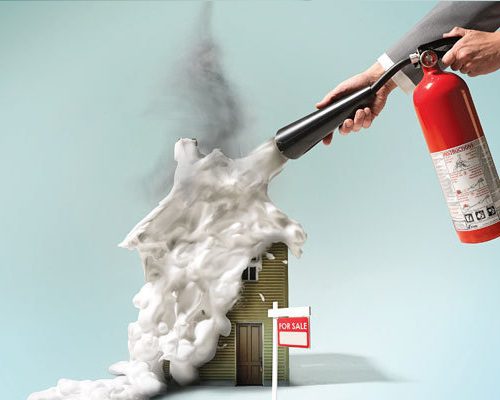It’s a simple question; in theory, at least.
And your answer cannot possibly be unbiased, and influenced by whether or not you own property, where you live, and a host of other variables.
I’d like to get a well-thought-out discussion going, not only on whether or not to cool the housing market, but also how.
Let’s look at Norway as an example…

Raise your hand if a larger percentage of your personal net worth has come from a tax-free capital gain on your primary residence, than that which has come from generating income from your occupation.
Is your hand raised?
You can see right off the bat how answering the question, “Should government take steps to cool the housing market” all depends on where you’re currently standing.
I’ve been hearing about the “collapse in the housing market” since I got into the business in 2003, and as I always like to muse, “The media has accurately predicted eight of the last two recessions.”
But the more our Toronto real estate market keeps gaining, the more we hear about possible government intervention to artificially cool the market down.
It would be artificial, right? If Jim Flaherty decided tomorrow that from now on, buyers must have a 20% down payment on a house or condo, and the market cooled as a result, that would be considered an “artificial” cooling, would it not?
There are some who believe that government should have a role in this. Governments use fiscal and monetary policy to regulate the economy; injecting money through spending to stimulate the economy, and raising interest rates to try and take money out of the market by encouraging consumers to save, and/or making it more difficult to borrow.
So let me ask the question again: should the government take steps to cool the housing market?
They have tried before…
In the last couple years, we’ve seen the following significant changes:
1) Minimum 5% down payment. I remember the days of 107% financing…
2) Minimum 20% down payment for second properties. We don’t want people running around and buying eight condos with 5% down, let alone at 107% financing…
3) Minimum 20% down payment for any property over $1,000,000. Shouldn’t million-dollar-buyers have minimum standards?
4) Reduction in amortization period from 40 years to 25 years. Pay off the mortgage faster, and pay less interest…
5) Qualification for all borrowers at a 5-year, fixed-rate, with a 25-year amortization. This gives them a bit of a buffer in case things change…
Did these changes do anything to cool down the market?
Not really, in my opinion…
So what is a finance minister to do?
A recent article in the Globe & Mail uses Norway as an example of how some countries’ financial regulators are “letting the air out of the housing bubble.”
(thanks to the online newspapers no longer allowing access, I can’t find the article online – but it’s titled “Norway Lets The Air Out Of Its housing Bubble,” by Saleha Mohsin)
Two excerpts I wanted to share:
“When it comes to residential property, Norway is among countries such as Canada, Australia, and Switzerland considered “high-flyers” in the past few years, according to Goldman Sachs Group Inc. These markets have benefited from robust recoveries as well as a significant dose of “inadvertent” monetary policies from the world’s largest central banks. Norway has seen some of the most dramatic increases, with house price gains of close to 30% since the first quarter of 2009.”
“Surging Norwegian prices, driven by low borrowing costs, have helped fuel consumer debt to twice-disposable incomes, prompting warnings from policy makers and economists that the development is unsustainable. In response, regulators introduced measures to cool demand, including capping loan sizes at 85% of a property’s value as well as higher capital requirements and risk weights on mortgages.”
Already, Norway has seen housing prices slide 1.5% in October from a month earlier, as per the article.
So we know that regulation can work, but only if extreme measures are taken.
I’d say that raising the minimum down payment for all borrowers to 15% would be extreme.
So if you answered “no” to the question: should the government take steps to cool the housing market, I’d like to know why.
If you’re a property owner, why would you want the housing market to cool? Chances are – your house has been rising in value ever since you purchased, so why kill the Golden Goose?
Unless you’re thinking about the “greater good” for the housing market, and the economy, I’d be surprised to hear that a current property owner wants the housing market to cool.
And if you’re not a property owner, of course you want the market to cool! You’re frustrated beyond belief with the cost of real estate in Toronto! You’ve become a real estate bear out of necessity because you NEED to believe that the crash is coming!
So try, for a moment, to take your own personal situation out of the equation.
Should the government take steps to cool the housing market?
If they should do so, I have five potential steps that finance minister Jim Flaherty should consider, of course, not all at once…
1) Raise Minimum Down Payment to 10%
From now on, lenders will only loan to a maximum of 90% of the property’s value.
This not only reduces exposure for the lender, in case the property decreases in value, but it also reduces the debt load on the borrower, and causes him or her to pay less interest.
This would probably have the largest effect at the lower end of the market, where first-time-buyers are spending $15,000 to purchase $300,000 condos. It would probably make the market feel a bit better to know that these people, many of whom are in their early 20’s, have $30,000 into the property instead.
With only a 5% down payment, many buyers risk “going underwater” on their properties if the values decrease.
Think about it: you probably have no problem dealing with the price volatility in your stock portfolio. If you owned shares of Research in Motion, you’re used to 5-10% ups and downs. I know the market has had a booming 2013, but in more realistic times, we’re all accustomed to seeing stocks go up and down, and up and down.
But when it comes to real estate, a 5% dip in the price of a property could completely wipe out a person’s equity.
Should we force buyers to provide a higher down payment? Should we ensure banks don’t continue to lend to 95% of value?
2) Make Borrowers Qualify At A Higher Interest Rate
The current variable rate mortgage is approximately 2.70%.
The current 5-year, fixed-rate mortgage is 3.49%.
Borrowers typically have to qualify based on a 5-year, fixed-rate mortgage with a 25-year amortization, even if they’re going with a variable rate at 2.70%.
But what if we took that a step further?
What if buyers had to qualify based on a 10-year rate?
We’re giving them 25-year amortizations, right? So how come they only qualify based on 5-year outlooks? What if interest rates are at 9.79% in 2018 when they go to renew?
Maybe building in a “buffer” would help protect the consumer from him or herself.
3) Raise Interest Rates
This is not an easy solution, and not one that can be utilized to cool the housing market, without having a massive effect on every industry, every business, and every person in Canada, not to mention the financial markets.
I only include this in the list because “raising rates” is so often suggested as a way to cool the housing market, as if it only applied to the housing market, and nothing else.
Is there a way to raise the interest rate for mortgagees, without changing the overnight lending rate?
4) Tighten Lending Guidelines On Multi-Unit Dwellings
A 4-unit property will likely still qualify for “conventional” financing, ie. a 20% down payment.
A 5-unit property will almost undoubtedly require a 30-35% down payment.
A 6-unit property or more, will not only require a 35% down payment, but will also likely require a commercial mortgage rate.
I’m not going to suggest that a duplex should require a minimum 20% down payment, but maybe something can be done to tighten lending practices when it comes to multi-unit dwellings.
Many lenders don’t need any proof of income or copies of leases for multi-unit dwellings. They simplly need the 20% or 35% down payment (depending on the size of the building), and they’re off to the races.
Perhaps the income derived from the property should factor in to the loan equation.
5) Privatize the CMHC
This idea will go over really well with a LOT of people!
Every time I talk to somebody who has 40-50% equity (or more) in their home, they say, “I wish the CMHC wouldn’t insure all these goddam high-ratio mortgages, and but a massive burden on the taxpayers. Some kid wants to buy an over-priced condo with 5% down, and the public has to take on the risk?”
As of March 31, 2013, CHMC’s insurance-in-force was $562,600,000,000, representing an insurance risk of approximately $17,000 per Canadian. (Source: Wikipedia)
Some say that’s not fair to each individual in Canada.
Some say that this is the way government operates, and it’s no different than the government offering free healthcare.
But I have to think that if the CMHC no longer directly “threatened” every person in Canada, then a lot of housing bears would ease up.
Perhaps some of these ideas could be put into play.
Or all of them.
Or none of them.
It depends on whether or not the government should let the free market ride, or whether they should intervene.
Every day, I see more and more articles on the housing market and how it continues to rise, but that’s nothing new. I also see more and more predictions of a decline, but that’s not a new idea either. I’ve been seeing the same predictions for a decade, all the while, the market has continued to rise.
Is that why we need government intervention?
I’ll be honest – I’m on the fence.
But I’d like to hear from all of you…
































Jeremy
at 9:04 am
http://www.steadyhand.com/industry/2013/11/12/delaying_the_inevitable/
“There is a glaring hole at the centre of modern economies….called central banking. We accept … that the modern economic world is highly complex… In most areas we also accept that free markets are perfectly capable of driving Adam Smith’s “invisible hand” to ensure that enlightened self-interest benefits the many as opposed to the few. But that one institution – the central bank – is even capable of mastering such complexity and fine-tuning the workings of a highly complex economy through the brute mechanism of dictating the price of money is barely discussed. …”
I think the bottom line is that there needs to be a system in place to ensure that buyers can actually afford the house they are buying. There are many ways to do that as you noted, including raising the minimum down payment. We put down around 30% on our tiny Toronto condo. The idea of only putting 5% down payment was frankly terrifying to me since many (Most?) that do it probably don’t actually have the financial security to buy a place.I also spent hours determining if we could ACTUALLY afford to buy the place we did and took steps like running the numbers at an interest rate significantly higher than what we are actually paying, and accelerating payments. Real estate is one piece of a larger fiscal responsibility puzzle.
AndrewB
at 4:42 pm
While that works in theory, tell me, what was the price and when did you buy your condo?
New entrants to the current economy would be putting down 80k for a 20% downpayment on a 400,000 dollar property.
I for one, put down 5% on the condo I just bought and am paying at an accelerated bi-weekly rate. Yeah it’s only a “paltry” 5%, however I’ve sat with multiple people and ran multiple numbers and invested the time to make sure I can afford.The difference between say, 5 and 10% down is such a minute difference in a gross monthly payment. I have no debt, including my partner, and we know what we can afford comfortably.
If this were even say 5 years ago? That 20% would be MUCH more attainable to put down as a down payment. Because of artificially low interest rates and greed from the market all around, prices have risen substantially in such a short period of time. So the only people we can blame for new entrants paying 5% to own a piece of something before prices go even higher (not matching inflation either) is ourselves as a city.
Schmidtz
at 9:25 pm
5% down, guy? You are part of the problem.
Stop being a piker and pay down some of that bitch. Get it to 15% stat, GUY.
AndrewB
at 11:19 pm
Who are you to judge my financial situation? You have no idea how much money I make and why I make my decisions. I’m part of no ones problem.
Jason H
at 9:32 am
The only thing raising the minimum payment does is prevent new buyers from coming into the market – which is a good thing don’t get me wrong.
What about “existing” purchases where they exceed the 5% threshold? I think debt-to-service ratio (if you can’t attack it with interest rates) would be a great equalizer in addition to your thoughts.
I have an above average salary and the amount I got offered for a mortgage the other day vs when I first bought my house is absolutely asinine. No wonder people keep buying up and the prices keep climbing.
Ridiculous.
AndrewB
at 4:46 pm
This is very true. I’ve been trying to stick to the 3x rule, but we ended up around 3.5x.
When I spoke with my broker, she laughed that I was worried about being at 3.5 (while having a low combined GDS with my partner) and said that the new market norm is more or less 5-6x gross monthly incomes. Scary.
Schmidtz
at 9:28 pm
Nope. You cant do anything on existing mortgages. Why? Because they are securitized and sold. Notice how no one EVER comes back to you and asks you for a credit update on a mortgage or a credit card? Right – because the debt has been packaged and sold. This is part of the problem of the credit economy we have. Eventually this will all end in tears. Talk about systemic risk. 2008 will look like a blip one day….
Kyle
at 10:30 am
David, i think you (and most media) have missed the point. Flaherty’s policies were not meant to cool the market, nor should they be. They are simply meant to reduce the risks represented by marginal buyers. To measure whether the policy change was succesful, forget about looking at whether or not prices come down, instead look at whether the marginal buyers are more solvent and have more skin in the game than they otherwise would have. In my opinion this is good policy, and targetted at where the risks lie, and i would encourage more of it. I like recommendation 1 and 2, but for recommendation 2, i don’t think it should be based on the 5 or the 10 year rate, as yield curves can shift and invert. It should just be an absolute spread over prime.
As far as cooling the market, i don’t think that should ever be the point of policy. For one thing it doesn’t work (just ask JP Morgan’s London Whale), it is like sticking your finger in holes in the dike, eventually market forces will prevail.
David Fleming
at 10:59 am
@ Kyle
I respectfully disagree.
I agree that Flaherty’s policies were enacted to reduce the risk by marginal buyers, and overall, to reduce the amount of debt that Canadians carry. This IS a good thing. Too many people are using their VISA’s and not understanding the consequences of compounded interest over time, and too many people are borrowing to buy houses and condos when they should be renting and saving instead.
But I also think his policies were intended to at least stop the real estate market from its upward ascent.
Read his quotes in this article, notably titled, “Housing Bubble Averted Thanks To Mortgage Rules: Flaherty”
http://business.financialpost.com/2013/05/23/housing-bubble-averted-thanks-to-mortgage-rules-flaherty/
Kyle
at 11:29 am
As a politician, i’m not surprised that he is trying to take credit for softening the market a bit. Because unlike credit quality, prices are something that the population can see, feel and relate to. I still believe if his primary intent was to deflate prices, then a tax on real estate would have been more effective. Instead he’s chosen a very targeted approach which really only impacts a segment of the market, not prices across the board. To me the article above reads more like spin and marketing masquerading as policy analysis.
As for where government should be intervening, i agree cosumer debt, is a big problem. And the rates and penalties that are charged on consumer debt are borderline criminal. Before they touch real estate they should be taking a hard look at loans till payday and credit card card company practices.
Pete
at 11:30 am
To me, the most important move the government could make would be in putting more stringent controls on foreign ownership and owners of multiple units. Too much of the activity and price increases have been driven by speculators.
Rob Fjord
at 12:30 pm
free markets work best, whenever the government gets involved distortions are created.
i see in a short time all those CMHC backed mortgages will be bailed out by taxpayers, or bail ins by bank account holders a la Cyprus. this will end badly, and you need to understand …. its by design! the international banksters have a simple game, turn on the money taps and lend it out, the lenders gorge themselves on debt and build houses, factories and mines, then the banksters turn the money taps off and call in the loans, the lenders default and the assets they bought/built are seized by the banksters, then when they believe they have extracted enough wealth they start the cycle over again. debt is slavery, especially when your lender is a psychopathic shylock, and government/media are just puppets of these sick bastards.
Frances
at 10:01 pm
Poppycock!
Paully
at 2:24 pm
The first thing that should happen is that CHMC should stop insuring million dollar mortgages. Why are the taxpayers backstopping the banks for someone who wants to buy a $999,000 property? The whole idea of CMHC coverage was to make home ownership MORE ACCESSIBLE. With the insurable limit at $1million, it has the effect of RAISING prices at the low end, as young and stupid people with no money but lots of insured credit bid up the prices to just under the million cap. It is stupid. It makes housing less accessible to first timers. The CMHC limit should be no more than $300,000. It is supposed to help people get INTO the market, not ladder UP the market.
Joe Q.
at 8:48 pm
Perhaps the solution is for the CMHC to only insure first-time home-buyers.
owngoal
at 8:34 am
Using interest rate policy to influence one segment of an economy is a really bad idea, which is why they changed the payment rules,CMHC etc.
The current low interest rate regime is the primary cause for the marginal buyers (ya, you Mr. 5%) to be in this market in the first place.
Without the artificially suppressed interest rate levels, housing prices probably would not have had the run that it has had over the last decade.
It’s sort of chicken/egg. Prices are up because the pool of buyers is quite large, based on low interest rate qualifiers, but at the same time, if the rates went up (even just by .75), that would wipe out a large group of potential buyers who were on the edge of affordability. Then prices would drop.
Just watch the condo market in Toronto over the next couple of years. Look how many projects go live with an instant block of units going up for sale…yeah, ,good luck with that flip.
Just because it hasn’t happened recently doesn’t mean in won’t happen. It will. It’s a cycle,
Joe Q.
at 1:38 pm
Lots of good points here, especially concerning the CMHC. People tend to underestimate its influence — it is the CMHC that allows banks to lend the way they do. I sometimes wonder what our housing market would look like if interest rates reflected equity levels (I believe this is the system in the UK; the smaller your down-payment, the more mortgage interest you pay. The opposite is sometimes true here.)
Credit card debt and payday loans are big concerns but are secondary to mortgage debt IMO. Extending huge amounts of credit to buy mass-produced consumer goods, even at usurious interest, doesn’t have the same effects as extending huge amounts of credit to buy land. Careful consumers don’t have to compete with credit addicts to buy toys, appliances, and vacations. But perhaps I’m just an “inexperienced buyer”.
AndrewB
at 1:00 am
Not only that, but many people are using their home equity to finance large amounts of debt. They think it’s gone because it’s rolled into a monthly mortgage payment, but it really isn’t.
NotAPiker
at 11:49 am
AndrewB, if you were so financially savvy you would have saved up the $80K rather than pay the 2.75% CMHC premium on your 5% down, $400K condo in exchange for the instant gratification of condo ownership. That premium of $11,000 tacked on to your principal and amortized over 25 years will end up costing you. Even another $20K on your down payment would save you $3,000 in premiums, an unbeatable return on investment.
Also, it appears your combined income is approximately $115K a year, not enough to be bragging about it on the internet. Be careful the info you give out, some of us can do math.